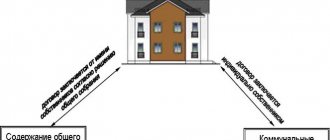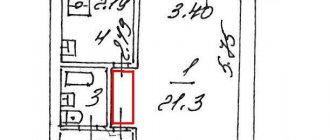The management agreement for an apartment building is concluded between the owners/HOA and the management organization and, as a rule, is valid for several years. During this period, the parties to the contract may need to adjust some of its terms. We tell you how to make changes to the control system and approve them correctly.
How to include ordinary and random conditions in the management agreement of an apartment building
70551
Consolidation of social tenancy agreements in connection with the creation of a family
Clause 1 of Article 82 of the Housing Code of the Russian Federation provides for the possibility of uniting citizens living on the basis of different social tenancy agreements in different rooms of the same apartment, under a common agreement, according to their will. Such a legal procedure is carried out at the request of interested parties, by concluding a single social tenancy agreement in the prescribed manner.
Citizens will continue to live in the same apartment, but the legal basis for residence will change. An important condition for concluding a general agreement, without which an agreement is impossible, is the unification of citizens into one family. Previously, the country's housing law allowed the conclusion of a single rental agreement for citizens in the process of starting a family; the law used the term: “uniting” into a family (see Article 87 of the RSFSR Housing Code). The modern Housing Code of the Russian Federation requires the already accomplished fact that citizens create one family in order to merge their social tenancy agreements into a common one. Typically, this right is enjoyed by persons who have become spouses.
Both parties can propose changes to the management agreement
According to Art. 162 of the Housing Code of the Russian Federation, the owners of premises in an apartment building, having chosen a management method with the help of a specialized organization, enter into a management agreement with such a management company. Also, a homeowners association or cooperative may act as a party to the agreement instead of the owners directly.
The management agreement is concluded in written or electronic form using the GIS Housing and Communal Services by drawing up one document signed by the parties, on the terms approved by the owners at the general meeting, for a period of at least one year, but not more than five years. If the parties do not declare the termination of the document upon expiration of this period, then it will be renewed automatically under the same conditions (parts 1, 4, 6 of Article 162 of the RF Housing Code).
However, during the term of the management agreement, the parties may need to make changes or additions to it. For example, add or exclude some obligations of the management organization, index the price of the contract, or include additional powers of the company. In this case, the parties need to reach an agreement and formalize the new conditions with an additional agreement to the management agreement.
The second case when an agreement can be changed is a court decision that has entered into force, but in this case it will no longer be an agreement of the parties, it is coercion. Let's consider the issue of voluntary conclusion of an agreement between the parties to the management agreement.
Analysis of errors when drawing up a management agreement for apartment buildings
87003
Changing the contract due to the departure of a family member or his death
The basis for changing the contract is the replacement of the previous employer with a new one by submitting an application to the authorized body. It is important that such a replacement is carried out legally: with the consent of the tenant’s family who lives with him, and with the permission of the landlord. Another immutable condition of the agreement is the legal capacity of the person planning to become an employer.
A citizen must have the opportunity to acquire both rights and obligations, bear responsibility for actions taken in relation to housing, and answer for the obligations imposed on him by law in the process of housing legal relations.
If the tenant under the social tenancy agreement has died, the contract is renegotiated upon application by a legally capable family member of the previous tenant who lives in the same apartment and has reached the age of majority at the time of the agreement. An important condition of the contract will be the written consent of the family and the permission of the landlord. A similar legal procedure applies in the event of a competent tenant leaving the premises. If the landlord refuses to change the terms of the social lease, despite the application being submitted on time and duly completed and the citizen having grounds for changes, the citizen can file an application with the judicial authorities to challenge the decision.
All changes to the management system are formalized by an additional agreement and approved by the OSS
The parties can make changes to the management agreement only through a decision of the general meeting of owners of premises in the apartment building. Without it, it will not be possible to approve adjustments and conclude an additional agreement: it is the OSS that has the authority to determine the terms of the management agreement and change them.
Changes must be formalized in writing: a draft additional agreement is submitted to the OSS, which must spell out all the adjustments that are made to the terms of the current management agreement. An additional agreement is considered concluded if a simple majority votes for it at the general meeting, that is, owners with 50% + 1 vote of all votes of the meeting participants. After general approval at the meeting, the document must be placed in the Housing and Communal Services GIS (Part 2.1 of Article 162 of the Housing Code of the Russian Federation).
An example of a preamble to an additional agreement to a management agreement
The effective date of changes made to the management agreement of the additional agreement is determined by the parties to the management agreement, approved at the general meeting and enshrined in the minutes of the general agreement. In this case, the effective date of adjustments to the contract may differ from the date the parties signed the additional agreement.
Such a document can be signed on behalf of the owners by persons authorized by the OSS: the chairman of the meeting, the secretary and members of the counting commission, the chairman of the MKD Council and its members. At the same time, the requirement of Part 1 of Art. 162 of the Housing Code of the Russian Federation on the need to collect signatures from owners who have more than 50% of all votes in the house.
Example from the OSS protocol on approval of an additional agreement to the management agreement
The additional agreement approved at the OSS, like the management agreement itself, is binding on all parties to the management agreement, including the management organization and the owners who did not participate in the voting. This is confirmed by judicial practice, for example, the decision of the Arbitration Court of the Sverdlovsk Region dated 04/06/2017 in case No. A60-59996/2016.
As a rule, the condition that changes to the management agreement are made on the basis of an approved additional agreement is prescribed in such an agreement itself. For example:
"P. 6.1. The Agreement may be amended or supplemented at the proposal of one of the parties in the manner prescribed by current legislation.
clause 6.2. The list of works and services for the maintenance and repair of common property provided for in this agreement may be changed with a simultaneous corresponding change in the price under this agreement in the event of changes in current legislation or based on a decision of the general meeting of owners of premises in the apartment building.
clause 6.3. Changes in the terms of the agreement are formalized by an additional agreement signed by the parties; the decision of the general meeting is an annex to the additional agreement.”
Requirements for the procedure for including additional services in a management agreement
392090
Other reasons for changing the social tenancy agreement
In addition to the cases considered, circumstances specified in the Housing Code of the Russian Federation may arise that actually change the contract, namely:
- Acceptance by citizens of a vacated room as part of a “communal apartment” under a social tenancy agreement. Such housing is provided upon application, in order of priority; the procedure for providing housing is clearly regulated (see Article 59).
- Forced eviction of a family member from a home by court, while the status of other living citizens does not change (see Art. 91).
- Accommodation of other persons as relatives of the tenant (see Article 70).
- Providing the tenant with other housing for the duration of the work (major repairs, reconstruction), if it is not possible to carry out such activities without evicting the tenants (see Article 88).
These situations change the subject composition of legal relations, and in the latter case, the subject of legal relations—the living quarters—changes temporarily. Accordingly, the social tenancy agreement undergoes significant changes with the onset of these circumstances.
Author of the article
What is the procedure for excluding a person from a social tenancy agreement?
The current civil and housing legislation does not provide for the exclusion of a person from a social tenancy agreement; in cases specified by law, termination or termination of a social tenancy agreement in relation to this person is possible. In this material, the exclusion of a person from a social rental contract is considered as termination or termination of the contract. The legal basis for termination of a social tenancy agreement by virtue of Part 5 of Art. 83 of the Housing Code of the Russian Federation is the loss (destruction) of residential premises or the death of a tenant living alone. The death of the tenant, if he lives with other family members included in the social tenancy agreement, entails his exclusion from the social tenancy agreement and his replacement by another tenant (Part 2 of Article 686 of the Civil Code of the Russian Federation). The exclusion of a person from a social tenancy agreement (termination of a social tenancy agreement) is possible in court, that is, the interested person has the right to file a claim with the district court (Article 24 of the Code of Civil Procedure of the Russian Federation) in compliance with the requirements of Art. Art. 131, 132 Code of Civil Procedure of the Russian Federation. If a citizen was included in a social tenancy agreement as a member of the tenant’s family, but did not exercise his right to move into the residential premises provided under this agreement, and did not live in it together with the tenant, then such a citizen may be excluded from the social tenancy agreement as who has not acquired the right to residential premises provided under this agreement (“Handbook for a judge in civil cases” (2nd edition, revised and expanded) (edited by N.K. Tolcheev) (“Welby”, “Prospect”, 2008 ); “Preparation of civil cases for trial in courts of general jurisdiction: A practical guide” (Tolcheev N.K., Gorokhov B.A., Efimov A.F.) (edited by N.K. Tolcheev) (“Norm”, "Infra-M", 2012)). The courts consider claims for the exclusion of a person from a social tenancy agreement, guided by the provisions on the loss of the right to use residential premises and on the termination of the social tenancy agreement (Appeal ruling of the Moscow City Court dated May 20, 2021 in case No. 33-19548/2021, Appeal ruling of the Moscow City Court court in case No. 33-34553/2020, Appeal ruling of the Moscow City Court dated July 24, 2019 in case No. 33-33845/2019). In accordance with Part 4 of Art. 83 Housing Code of the Russian Federation, Part 2, Art. 687 of the Civil Code of the Russian Federation, judicial exclusion from a social tenancy agreement (termination of a social tenancy agreement) of residential premises at the request of the landlord is permitted in the event of: - failure by the tenant to pay for the residential premises and (or) utilities for more than 6 months; - destruction or damage to residential premises by the tenant or other citizens for whose actions he is responsible; - systematic violation of the rights and legitimate interests of neighbors, which makes it impossible to live together in the same residential premises; - use of residential premises for other purposes. If the tenant of a residential premises or other citizens for whose actions he is responsible use the residential premises for other purposes or systematically violate the rights and interests of neighbors, the landlord, before going to court, can warn the tenant about the need to eliminate the violation (Part 3 of Article 687 of the Civil Code of the Russian Federation) . If a citizen's right to use residential premises is terminated, the landlord sets a deadline for him to vacate the premises. If he does not vacate the premises within the prescribed period, he is subject to eviction on the basis of a court decision (Part 1 of Article 35 of the Housing Code of the Russian Federation). A rental agreement for residential premises can be terminated in court at the request of any of the parties to the agreement if the premises cease to be suitable for permanent residence, as well as in the event of its emergency condition (Part 3 of Article 687 of the Civil Code of the Russian Federation). If the tenant and (or) members of his family living with him use the residential premises for other purposes, systematically violate the rights and legitimate interests of neighbors or mismanage the residential premises, allowing it to be destroyed, the landlord is obliged to warn them about the need to eliminate the violations. If violations entail the destruction of residential premises, the landlord also has the right to assign the tenant and his family members a reasonable period to eliminate these violations. If the tenant and (or) members of his family living with him, after warning the landlord, do not eliminate the violations, the guilty citizens, at the request of the landlord or other interested parties, are evicted in court without the provision of other living quarters (Part 1 of Article 91 of the Housing Code of the Russian Federation). Termination of a social rental agreement for residential premises and eviction of citizens from it at the request of the landlord or state authorities and local governments, as follows from the provisions of Part 4 of Art. 3 of the Housing Code of the Russian Federation, are possible only on the grounds and procedure established in the Housing Code of the Russian Federation (Articles 29, 83, 85 - 91 of the Housing Code of the Russian Federation) (clause 35 of the Resolution of the Plenum of the Supreme Court of the Russian Federation dated July 2, 2009 N 14 “On some issues that have arisen in judicial practice when applying the Housing Code of the Russian Federation”, hereinafter referred to as Resolution of the Plenum of the Armed Forces of the Russian Federation No. 14). A person may be excluded from a social tenancy agreement (the agreement is considered terminated) by virtue of Part 3 of Art. 83 of the Housing Code of the Russian Federation in the event of the departure of the tenant or members of his family to another place of residence from the date of departure, unless otherwise provided by federal law. In this case, it is necessary to take into account the provisions of paragraph 32 of the Resolution of the Plenum of the Armed Forces of the Russian Federation No. 14 that in the temporary absence of the tenant of the residential premises and (or) members of his family, including former family members, they retain all rights and obligations under the social rental agreement for residential premises (Article 71 of the RF Housing Code). If the absence of these persons from the residential premises is not temporary, then interested persons (landlord, tenant, members of the tenant’s family) have the right to demand in court that they have lost the right to residential premises in connection with leaving for another place of residence and thereby terminating the social contract hiring When considering the case, the court finds out: for what reason and for how long the defendant is absent from the residential premises, whether his departure from the residential premises is forced (conflictual relationships in the family, divorce) or voluntary, temporary (work, training, treatment, etc. .) or permanent (has taken out his belongings, moved to another locality, entered into a new marriage and lives with a new family in another residential building, etc.), whether there have been any obstacles to him in using the residential premises from other persons living in it, whether the defendant has acquired the right to use another residential premises in a new place of residence, whether he is fulfilling obligations under the contract to pay for residential premises and utilities, etc. When circumstances are established indicating the defendant’s voluntary departure from the residential premises to another place of residence and the absence of obstacles in the use of residential premises, as well as his unilateral refusal of rights and obligations under the social tenancy agreement, the claim to recognize him as having lost the right to residential premises shall be satisfied in connection with the termination of the social tenancy agreement by the defendant in relation to himself. The absence of a citizen who voluntarily left a residential premises for another place of residence, in the new place of residence, the right to use residential premises under a social tenancy agreement or the right of ownership of residential premises cannot in itself be a basis for recognizing the absence of this citizen in the disputed residential premises as temporary , since citizens, at their own discretion and in their own interests, exercise their housing rights. A citizen’s intention to refuse to use residential premises under a social tenancy agreement can be confirmed by various evidence, including certain actions, collectively indicating such an expression of will of the citizen as a party to the residential tenancy agreement. In addition, a claim for eviction from a residential premises and, accordingly, exclusion from a social tenancy agreement of parents deprived of parental rights may be filed by the guardianship and trusteeship authorities, the guardian (trustee) or adoptive parent of the child, the prosecutor, as well as a parent who has not been deprived of parental rights. right The corresponding claim (Part 2 of Article 91 of the Housing Code of the Russian Federation) is subject to satisfaction if, during the trial, the court comes to the conclusion that it is impossible for these citizens to live together with children in respect of whom they have been deprived of parental rights (Clause 40 of Resolution of the Plenum of the Armed Forces of the Russian Federation No. 14 ). According to Art. 688 Civil Code of the Russian Federation, Art. 84 of the Housing Code of the Russian Federation, in the event of termination of the rental contract for residential premises, the tenant and other citizens living in the residential premises at the time of termination of the contract are subject to eviction from the residential premises on the basis of a court decision. In accordance with Art. 107 of the Federal Law of 02.10.2007 N 229-FZ “On Enforcement Proceedings”, if within the established period for the voluntary execution of the court decision on eviction it is not executed, the bailiff issues a resolution to collect an enforcement fee from this person and sets a new deadline for him for eviction and warns him that upon expiration of the specified period, forced eviction will be carried out without further notice to him. Fulfillment of the eviction requirement includes the release of the premises specified in the writ of execution from the debtor, his property, pets and the prohibition of the debtor from using the vacated premises. Compulsory execution of the requirement for eviction is carried out with the participation of witnesses (if necessary, with the assistance of employees of internal affairs bodies) with the drawing up of an appropriate eviction act. For the purpose of forced eviction, the bailiff has the right to involve an appropriate specialized organization.
The article material is taken from open sources
Do you have any questions for your lawyer on this topic?
Ask them right now here, or call us by phone in Moscow +7 (499) 288-34-32 or in Samara +7 (846) 212-99-71 (24 hours a day), or come to our office for a consultation (by pre-registration)!







